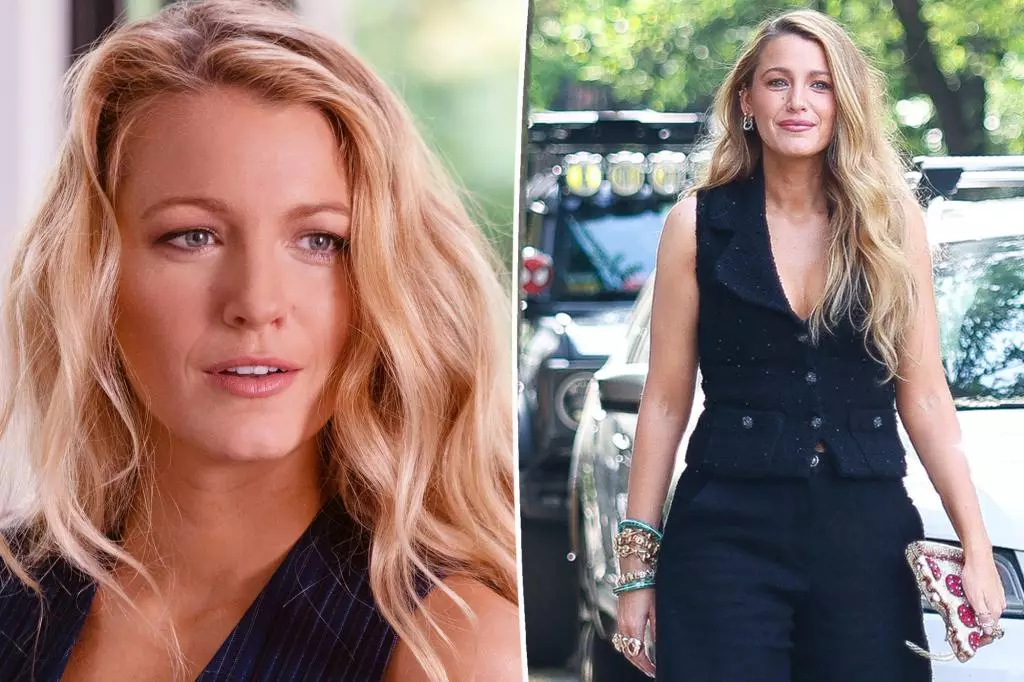In the current entertainment landscape, stars are often caught in a relentless cycle of scrutiny that blurs the lines between personal and professional lives. Blake Lively, a name synonymous with charisma and Hollywood elegance, recently found herself embroiled in a whirlwind of social media backlash that reveals much about the volatile nature of fame. The announcement of her upcoming film, “The Survival List,” initially intended as a showcase of her creative versatility, became overshadowed by a bitter feud stemming from her legal dispute with director Justin Baldoni. Social media users, wielding their keyboards with relentless fervor, dissected her every move, laying bare the undercurrents of rivalry, suspicion, and fan loyalty that mirror the complex web of celebrity culture.
The malicious commentary, ranging from light-hearted jabs to vicious digs, exposes a tendency among fans and critics alike to impose their perceptions on stars beyond the confines of their onscreen personas. Some questioned her professionalism, sarcastically conflating the film’s cast list with IMDb profiles, simultaneously demonstrating how disconnect and rumor-mongering distort public understanding. Others probed into her personal affiliations, especially her estrangement from Taylor Swift, insinuating that her music choices and relationships are inherently intertwined with her career trajectory. These reactions highlight a troubling aspect of modern fame: the reduction of multi-dimensional individuals into caricatures, often driven by unfounded gossip rather than facts.
Despite the widespread negativity, a silent majority of fans manifested unwavering support, emphasizing the importance of individual agency and personal choice. This dichotomy underscores a vital truth—public opinion is a fickle landscape where validation is as fleeting as a trending hashtag. Lively’s resilience in the face of online hostility underscores her awareness of the tumultuous environment she navigates, yet it also raises critical questions about the entitlement fans feel to scrutinize and judge celebrities’ every move.
Behind the Scenes: Power Struggles and Legal Battles
The controversy surrounding Blake Lively extends far beyond social media commentary; it delves into the murky waters of industry power dynamics and legal warfare. Her recent lawsuit against Baldoni and his studio is a stark reminder that Hollywood’s glittering façade often conceals intense personal and professional conflicts. Accusing Baldoni of sexual harassment and reputation sabotage reveals a fragile side of an industry that frequently struggles with accountability and transparency. The subsequent counter-suit for extortion and defamation paints a picture of tit-for-tat clashes that threaten the careers and mental well-being of those involved.
The legal saga, scheduled to culminate in trial in 2026, exemplifies how even the most glamorous stars are not immune to the darker realities of Hollywood’s power plays. It questions whether fame grants protection or merely amplifies vulnerability when disputes escalate to the courts. Lively’s willingness to confront these issues publicly demonstrates her refusal to be silenced by intimidation tactics, asserting her voice in a domain where voices are often hushed or manipulated.
Moreover, her admissions about overstepping boundaries as an actress reveal an internal struggle—balancing the desire for creative freedom with the pressures of industry expectations. Her candidness about feelings of inadequacy and the need for authorship highlight an underestimated facet of celebrity life: the quest for authenticity and control amidst a sea of expectations and image management. This introspection reveals her as a multi-layered individual who refuses to be confined solely to her on-screen roles, challenging the stereotypical narrative of Hollywood diva.
The Paradox of Celebrity: Struggle, Support, and Self-Discovery
Blake Lively’s journey offers a compelling lens into the paradoxical nature of celebrity—a blend of external adulation and internal tumult. Her recent projects, including “The Survival List,” serve dual purposes: a showcase of her talents and a battleground where her resilience is tested publicly. The movie’s premise, revolving around survival and unexpected alliances, metaphorically mirrors her own experiences navigating industry storms and personal trials.
Audiences are compelled to consider whether true strength lies in silence and detachment or in embracing vulnerability and confrontation. Lively’s openness about her challenges suggests a shift towards authenticity, inviting fans to see her not just as a glamorous figure but as a resilient woman who fights for her truth. Her ability to maintain her career amidst scandal, legal battles, and social media storms speaks volumes about her resolve. It illuminates a broader narrative—that perseverance and self-belief can indeed triumph over the noise of negativity and misinformation.
Ultimately, Blake Lively’s story underscores a vital lesson about modern fame: the importance of staying true to oneself in an environment that continuously tests one’s integrity. Her willingness to face adversity head-on, while maintaining her professional pursuits, demonstrates a remarkable strength that transcends petty online disputes. In a landscape where stars are often commodified and scrutinized into caricatures, her resilience serves as a testament to the enduring power of authenticity and self-confidence.

